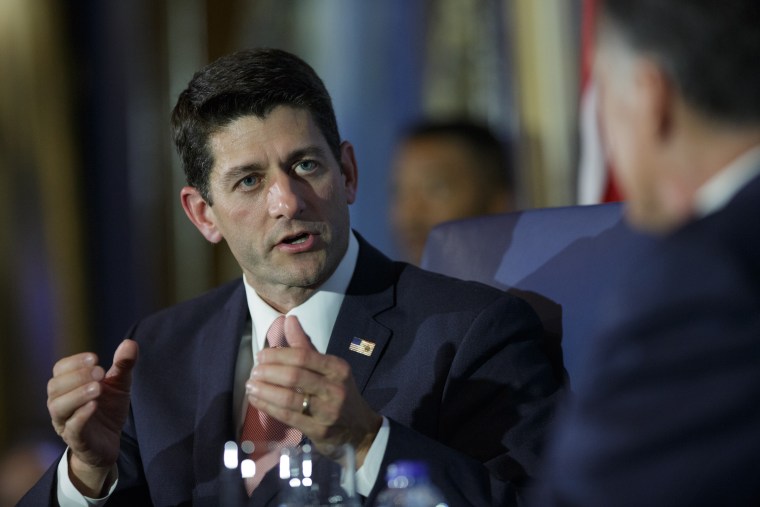Remember the government shutdown? Last fall, House Republicans thought it'd be a good idea to shut down the federal government for reasons no one, including them, can fully explain. It apparently had something to do with some ill-defined hostage strategy in which GOP lawmakers wanted to take health care benefits away from Americans, but the whole scheme was a fiasco.
House Budget Committee Chairman Paul Ryan (R-Wis.) reflected on the disaster in his new book, telling readers, "In short, the strategy our colleagues have been promoting was flawed from beginning to end. It was a suicide mission, but a lot of members were more afraid of what would happen if they didn't jump off the cliff."
It led to an interesting exchange yesterday between Ryan and CBS's Bob Schieffer on "Face the Nation."
SCHIEFFER: I guess I would ask you first, why didn't you say that back then? RYAN: Because I want party unity. I don't think it was constructive for conservatives to be carping at each other.
This is a curious argument. Ryan had a choice: support a misguided government shutdown that damaged the economy or support party unity. By his own admission, the Wisconsin congressman decided to prioritize the latter.
Ryan didn't think it was constructive for Republicans to be divided, though apparently it was constructive for Republicans to shut down the federal government.
I feel like this sentiment comes up more often than it should. Reflecting on the recent fight over a border bill, Rep. Raul Labrador (R-Idaho) said, "Before now, our leadership was looking at what can pass in the Senate. That's not my concern. I want the most conservative piece of legislation that can pass the House."
Right, because governing isn't important; Republican unity is important. The job of the House majority isn't to help shape federal law, but rather, to keep GOP lawmakers together, regardless of the consequences.
And speaking of government shutdowns, aren't we approaching another deadline?
Sahil Kapur reported the other day on what we can expect when Congress returns from its five-week break.
Rep. Paul Ryan (R-WI) says the Republican-led House intends to avoid a government shutdown this fall by passing a "clean" funding bill and approving a short-term reauthorization of the Export-Import Bank. [...] If the House passes these two measures -- and that's hardly a given -- it would all but take a government shutdown off the table through the midterm elections. Senate Democrats would have little justification for not adopting them in order to keep the government running.
Current funding expires on Sept. 30. Congress only has 10 scheduled work days in September, but nearly everyone assumes lawmakers will avoid a shutdown, since another easily avoided crisis shortly before the elections would be political suicidal.
